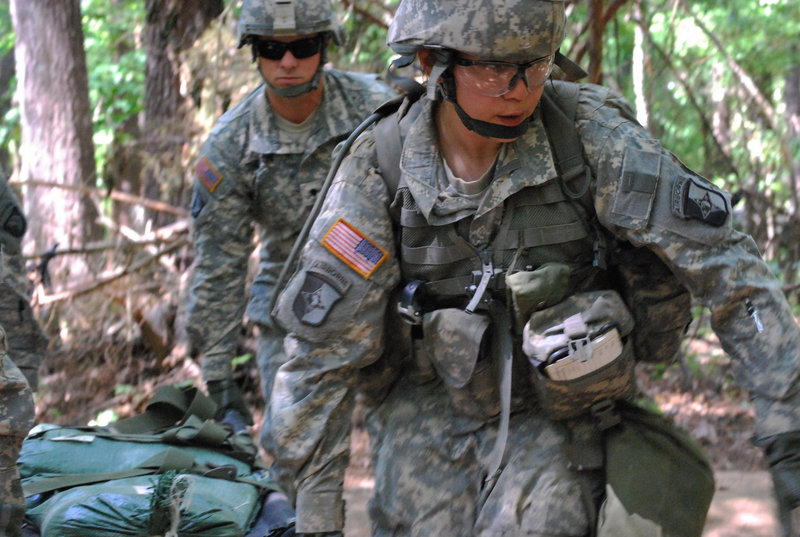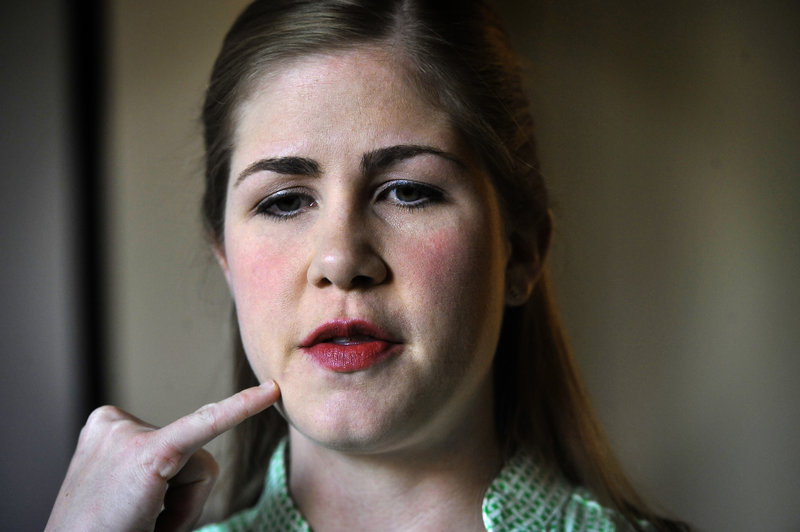BALTIMORE – As a woman in the Army, Staff Sgt. Jennifer Hunt is barred from serving in the infantry. But that didn’t stop commanders in Afghanistan from tapping her when they needed a female soldier to accompany men on their door-kicking missions.
Hunt’s job on those house-to-house raids was to search any women and girls they came across. Not having trained with the teams, she says, made the work more dangerous.
“The infantry operates together,” she said. “Then I get kind of dropped in on them, and I don’t know what their operating procedures are. If ‘X’ happens, what is their reaction to it?”
The 28-year-old Gaithersburg, Md., reservist, who earned a Purple Heart in Iraq, is one of four servicewomen suing Defense Secretary Leon Panetta to end the long-standing policy that excludes women from serving in direct combat.
The women, each of whom has served in Afghanistan or Iraq, say the combat exclusion policy is unconstitutional and outdated in an age of war without front lines — where anyone might face hostile fire and women are called on to provide close support to fighting troops.
The Clinton-era policy bars women from infantry, artillery, tank and other units that engage in direct combat with the enemy — currently some 238,000 positions, or about one-fifth of the regular, active-duty armed forces. Most of the male-only jobs are in the Army and Marines, the “tip of the spear” of the U.S. military.
Panetta was chief of staff to President Bill Clinton when the policy was developed in 1994.
The service members in the lawsuit, who are represented by the American Civil Liberties Union, say the rule denies women the opportunity to train with units that they might end up fighting alongside, makes it more difficult for them to advance in military careers and endangers all troops by preventing commanders from assigning the best personnel to perform missions.
“If someone’s going to cover you in a firefight, you don’t care if that person’s a man or a woman,” said Hunt, a member of the 450th Civil Affairs Battalion, based in Riverdale. “You just care that they can shoot and move.
“Taking down this combat exclusion policy is going to allow the military to take the best-qualified people, men or women, who can meet the physical standards.”
The lawsuit, filed last month in California, is the most recent salvo in the long battle to open more jobs in the military to women, who now make up 14 percent of the armed forces.
More than 280,000 women have served in Afghanistan or Iraq since Sept. 11, 2001. More than 150 have been killed, and nearly 1,000 wounded.
The Defense Department, under pressure from Congress, has been looking for ways to expand opportunities for women. In February, the Army opened about 14,500 positions previously off-limits to women, including jobs for intelligence and personnel officers, and artillery and tank mechanics.
The Marine Corps is allowing women to attend its grueling Infantry Officer Course; the first two volunteers last fall failed to complete the 10-week program. The Marines are also assigning women to train in certain combat-related jobs with infantry, artillery, tank and other units for testing purposes.
A Pentagon spokesman declined to comment on the pending litigation but said Panetta is “very committed to examining the expansion of roles for women.”
“His record is very strong on this issue,” spokesman George Little said.
But an attorney for the servicewomen said the numbers so far “simply fall short.” Ariela Migdal, a staff attorney with the ACLU’s Women’s Rights Project, says women are already serving in combat but often not getting the same credit as men, or the same opportunities for training and promotion.
According to the plaintiffs, 80 percent of Army generals come from positions closed to women.
“Of course it’s welcome that they’re tweaking the policy around the edges, but the core exclusion is still in place,” Migdal said. “Whole career fields, whole combat arms and whole schools remain closed.”
Hunt’s co-plaintiffs include California Air National Guard Maj. Mary Jennings Hegar, a helicopter pilot who earned a Purple Heart and a Distinguished Flying Cross with Valor in Afghanistan; Marine Capt. Alexandra Zoe Bedell, who has deployed twice to Afghanistan; and Marine 1st Lt. Colleen Farrell, who also has deployed to Afghanistan.
Joining them as a plaintiff is the Service Women’s Action Network, a New York-based advocacy group.
“The military is the last place with legalized sex discrimination in the United States,” said former Marine Capt. Anu Bhagwati, executive director of the network. “It fosters a broader atmosphere of sexism toward women. You can’t expect women to be treated well with a discriminatory policy.”
Hunt joined the Army Reserve after the Sept. 11 terrorist attacks. She earned a Purple Heart in September 2007, when the Humvee in which her civil affairs team was traveling through Baghdad rolled over a roadside bomb. Shrapnel hit her face and upper body, and she suffered an electrical burn on her back.
Hunt and her fellow plaintiffs say the combat exclusion policy is not mandated by any statute and violates their “rights to equal protection of the law under the Due Process Clause of the Fifth Amendment.”
“I think it’s a lot simpler than folks are making it out to be,” said Bhagwati, who served in the Marines from 1999 through 2004. “Now, whether are not there are tens of thousands of women who can pass those tests and achieve all those tasks is another question altogether. But what this suit is really all about is the opportunity to compete.
“Just open the doors and let women compete. And if they fail, then they fail. But if they succeed, then you need to allow them to do what they were trained to do.”
Send questions/comments to the editors.




Success. Please wait for the page to reload. If the page does not reload within 5 seconds, please refresh the page.
Enter your email and password to access comments.
Hi, to comment on stories you must . This profile is in addition to your subscription and website login.
Already have a commenting profile? .
Invalid username/password.
Please check your email to confirm and complete your registration.
Only subscribers are eligible to post comments. Please subscribe or login first for digital access. Here’s why.
Use the form below to reset your password. When you've submitted your account email, we will send an email with a reset code.